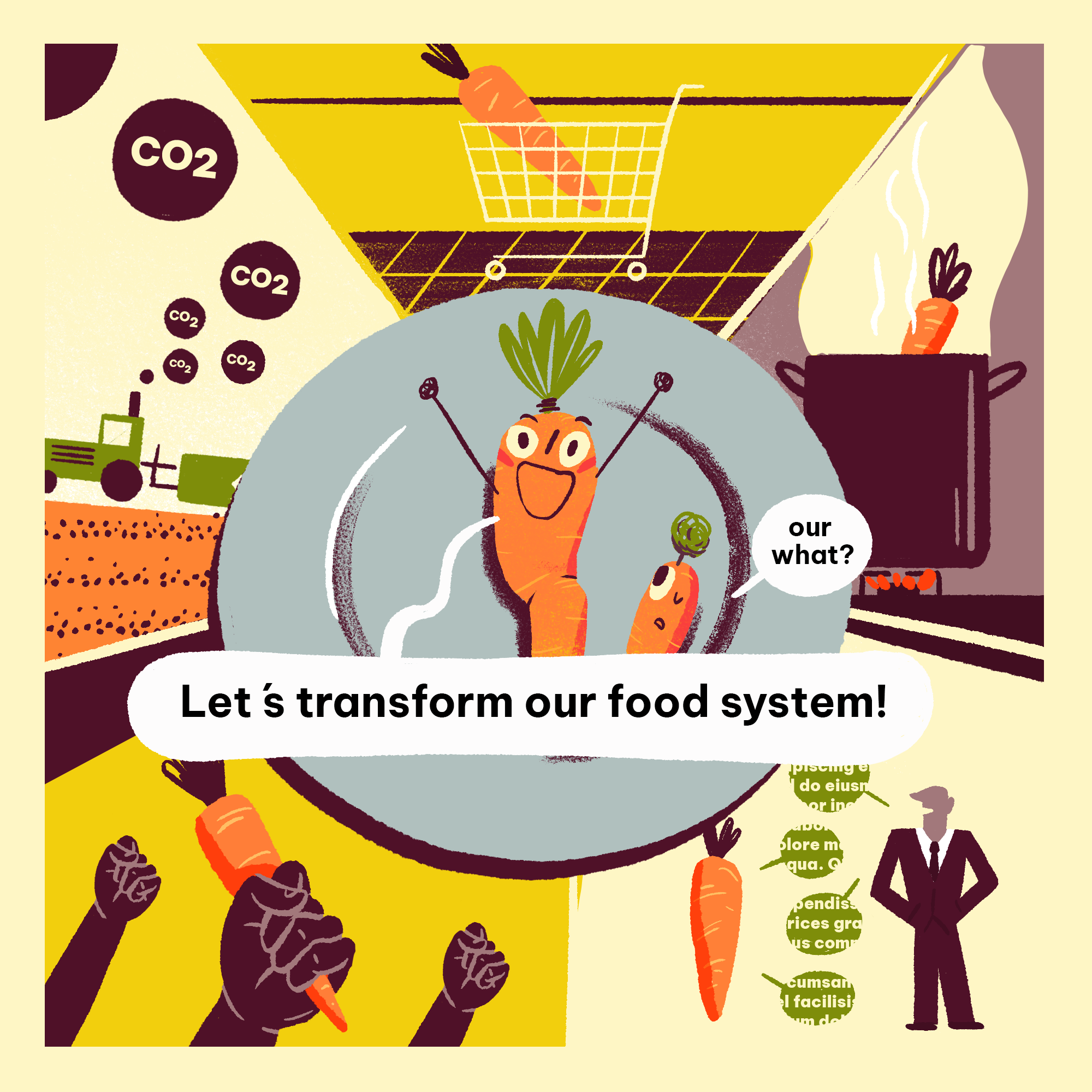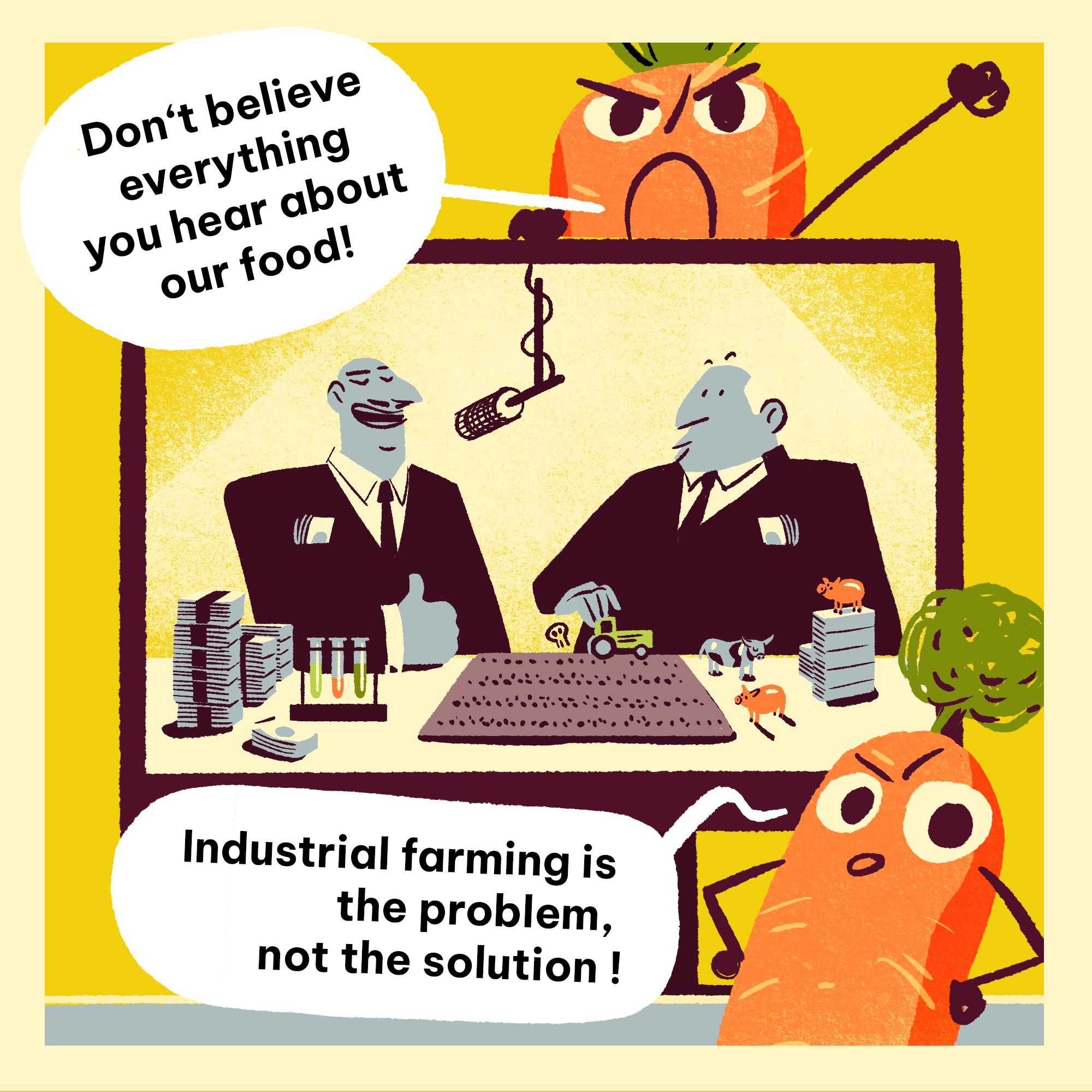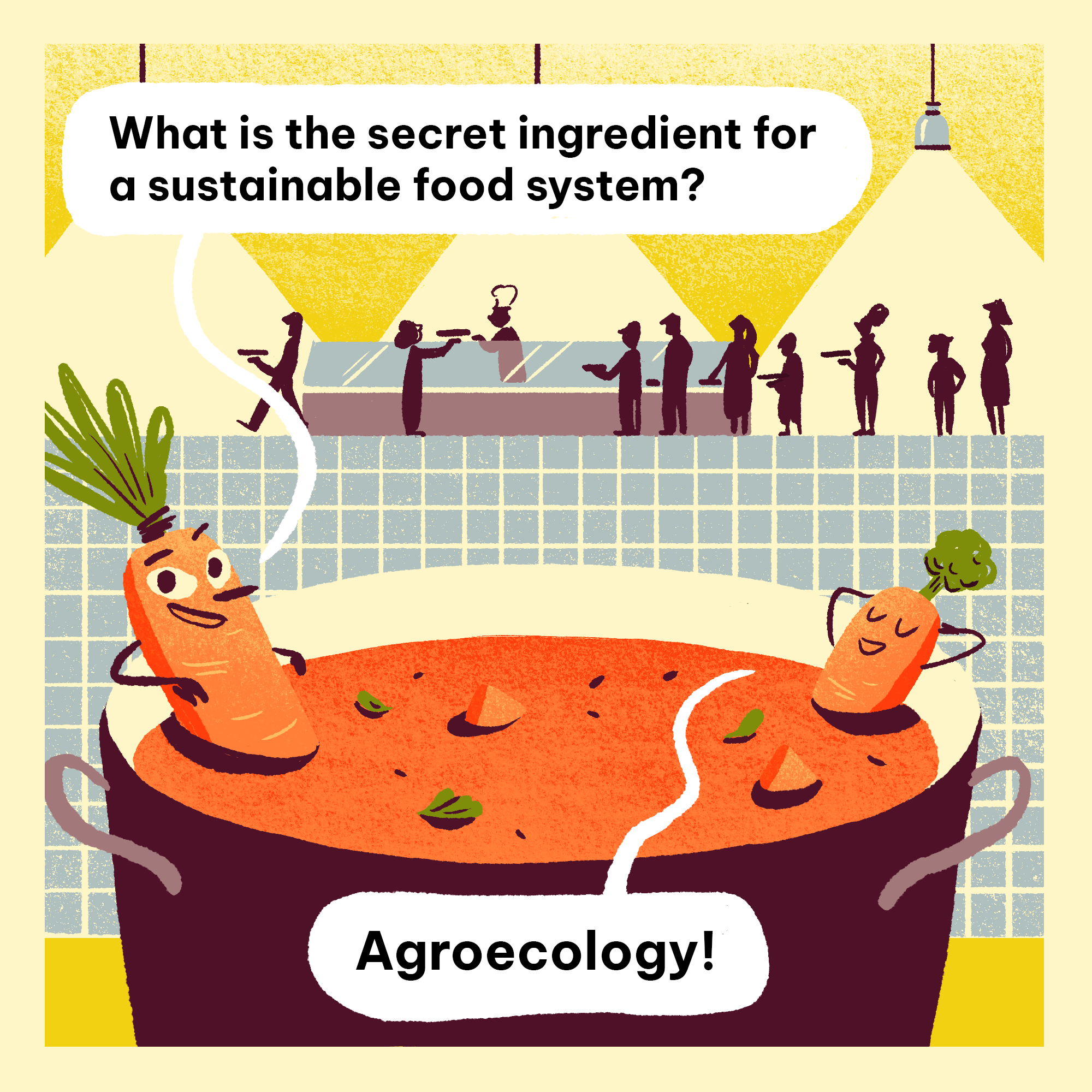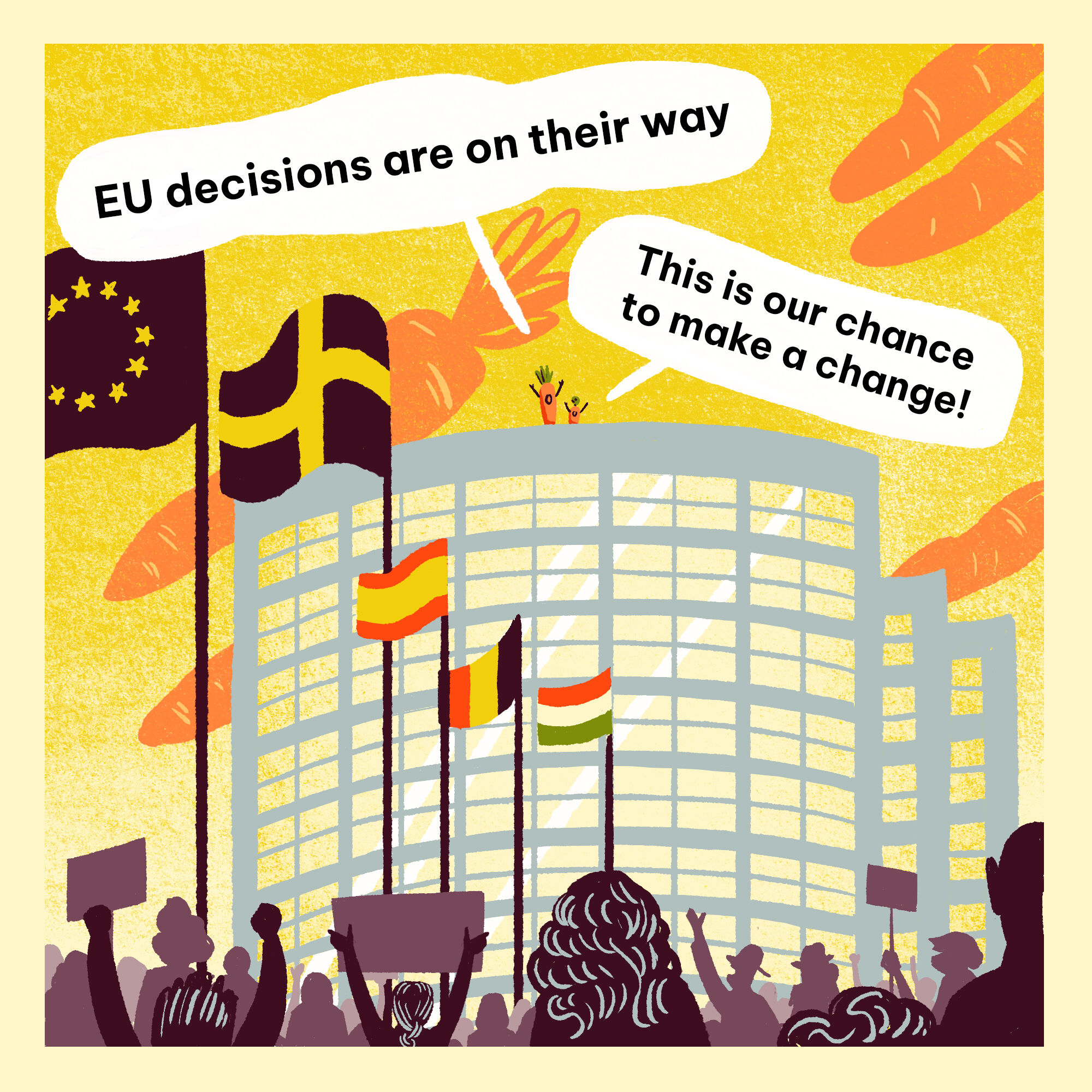Food Systems Info-Comics
The EU Commission still owes us a proposal for sustainable food systems. Meanwhile: Do you want to learn more about food systems and the change we want to see? Follow the carrot’s journey and start conversations – whether on your dinner table or on social media. Make your voices heard! These comics are unbranded, free to use and available for download in 14 languages. For a complete social media guide including post texts, hashtags and handles to tag click here.
Illustrations @Annika Huskamp
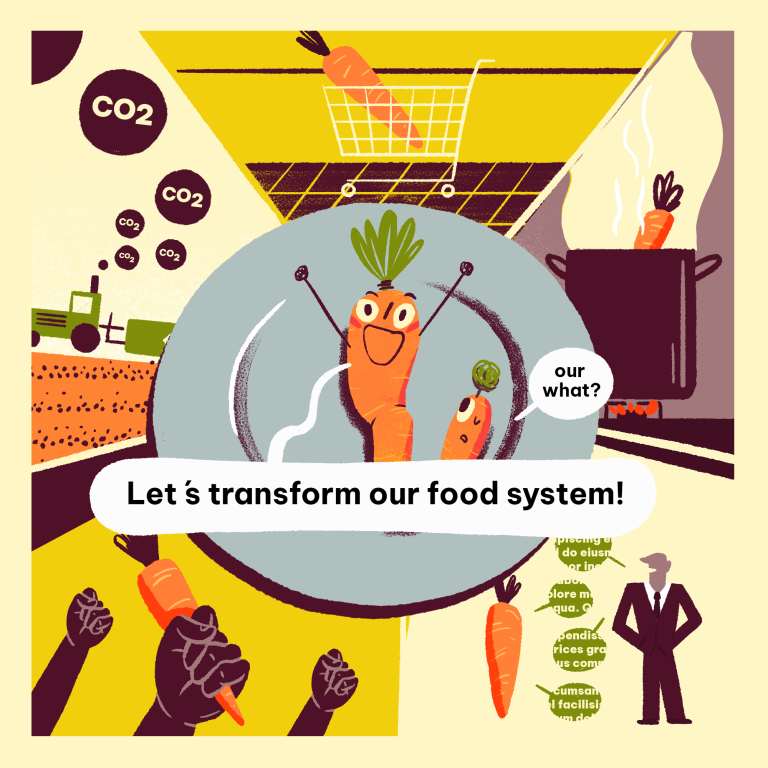
What is a food system?
Food systems encompass all activities related to the production, distribution, consumption and governance of our food. Think about the carrot: from a food system perspective, we can see that for this carrot to get on your plate it goes through a long process, starting with a farmer planting the seed (or even before that). Unfortunately, the dominant industrial farming model involves practices such as the spraying of synthetic pesticides which harm people’s health and nature. While pesticide companies make big profits, small-scale farmers get the short end of the deal. After harvest, the carrots are transported to various markets and eventually sold to canteens, and people who cook and serve them on the plate. All these food interactions happen within a context that is shaped by political decision-makers and influenced by culture. Our food system thus includes food producers, consumers and politicians but also large-scale distributors and agrochemical companies. Fortunately, there are many citizens and civil society organisations who help transform our food system by demanding affordable, nutritious and sustainable food for all.

What is the problem?
At production level, our food system is driven by industrialization and the lobby of agrochemical businesses. Industrial farming depends on the heavy use of synthetic pesticides, chemical fertilisers and monocultures that threaten biodiversity and push out small-scale producers. Relying on this system of industrial production leads to soil depletion, water pollution, wildlife peril and poses health risks through pesticide exposure. In short, it endangers the entire ecological system upon which food production depends. Additionally, industrial agriculture concentrates profits in the hands of few transnational corporations forcing local farming communities into poorly paid labour.
At the market level, the food industry prioritises profit over social and environmental concerns. For example, marketing strategies like buy 2-for-1 deals and limited time offers encourage over-purchasing and waste. Additionally, aesthetic market standards for food products are unnecessarily high, resulting in perfectly fine food being rejected or discarded by supermarkets. We need policies that ensure food systems for people – not profits!
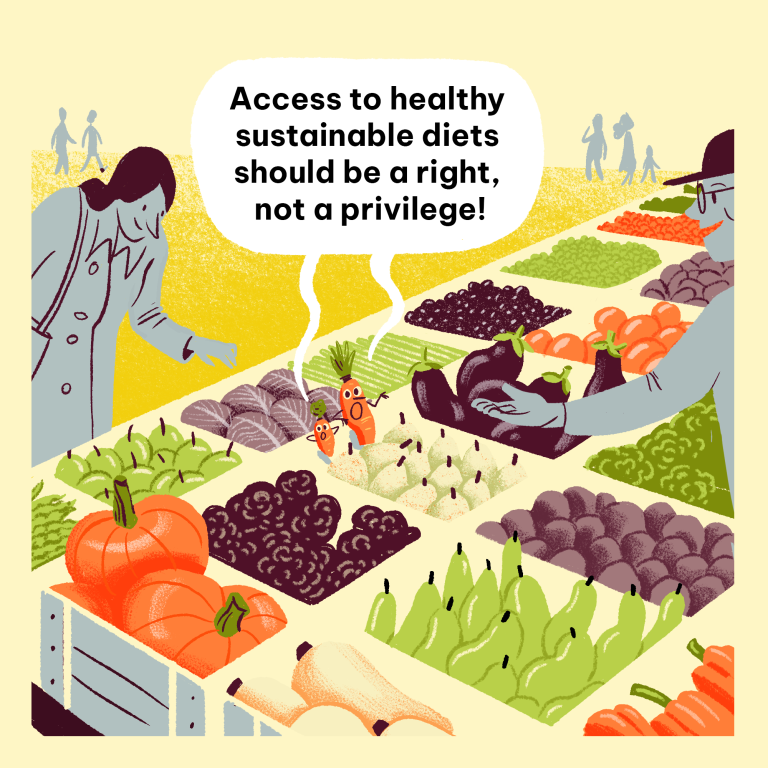
The food that costs us
Every fifth person in Europe cannot afford the food needed to fulfil their basic needs on a regular basis. Industrial food with low nutritional value is often the most affordable. It is also the most accessible in shops and canteens. As a result an increasing number of people are eating unhealthy diets that lead to health risks such as obesity, diabetes and heart disease.
European food policies like the Common Agricultural Policy dedicate subsidies to large-scale industrial farming that supply cheap animal proteins at the cost of public health, animal welfare and the climate. Subsidies should instead be supporting agroecological producers and sustainable diets.
Despite the fact that farmers and field workers produce enough food to feed the world, hunger and malnutrition are on the rise. This is because our current system favours overproduction but fails to achieve a fair distribution of food. Currently, food prices are increasing but farmers’ incomes are not, so neither producers or consumers are living in a fair system. It is important that food systems prioritise fair prices for farmers and the right to healthy food for all!

Debunk Myths
Multinational companies tell us only an industrial farming model can feed the world so they can continue to secure profits from the sale of engineered seeds, synthetic pesticides and highly processed food. The agroindustry lobby covers up the destructive impact of industrial farming, and the reason for this is simple – they do it to keep up their toxic business. Let’s think like a carrot and disprove a common agroindustry claim…
Myth: Farmers won’t be able to feed the world without pesticides
Fact: Pesticides contaminate soils, threaten biodiversity and are responsible for an estimated 385 million acute poisonings of farmworkers each year. Scientists warn that any intensification of pesticide use will put at risk our future food supply. Since the climate crisis increases the frequency of extreme weather events, we need resilient and adapted farming systems. Especially in cases of drought, organic farming is starting to outperform conventional. Agroecological practices such as agroforestry and diverse crop rotation have helped farmers with little resources to increase yields and protect nature.
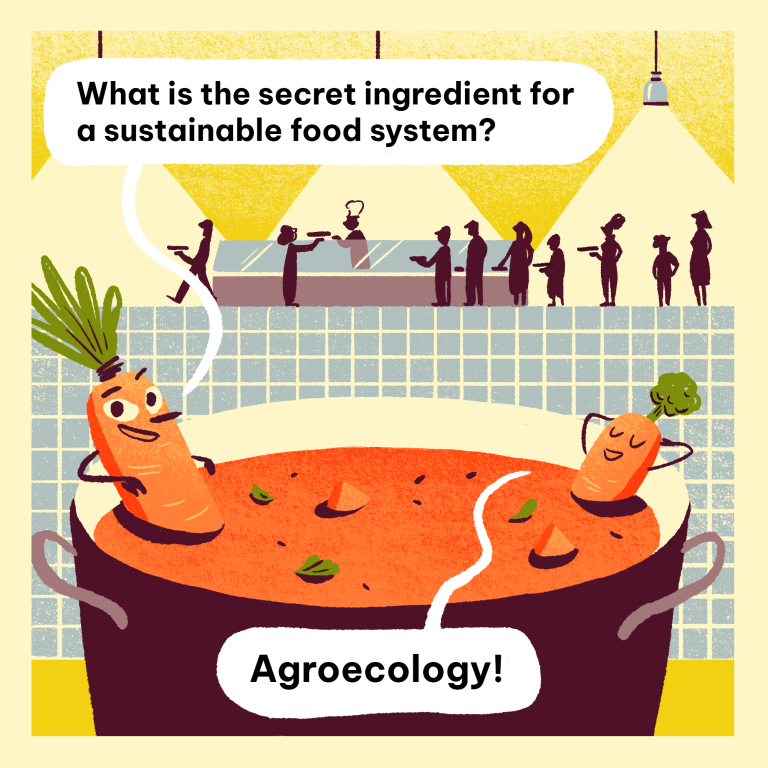
What is a better way?
We need to develop a holistic understanding of the relationships between food, farming and people: Agroecology. Agroecology is a farming system based on ecological, social and political principles to feed communities while respecting the environment. It is also a social movement of people fighting for food sovereignty, the livelihoods of small-scale food producers, indigenous knowledge and the right to nutritious food for all. A switch to agroecology across Europe would reduce greenhouse gas emissions from the agricultural sector by 40%, increase biodiversity and protect natural resources.
One way to promote agroecological principles is the improvement of public food procurement. It is a process by which public authorities purchase food for distribution in settings such as schools, hospitals, food banks or in cases of emergency food aid. Access to healthy diets could increase if the procurement practices favour local, seasonal, plant-based food. We need approaches like these to address the interconnected problems in our food system. Governments and public authorities can set fair food prices, enable direct sales and use strategies such as accurate demand planning. Therefore, public procurement could help local farmers secure their income and reduce food waste at the same time.
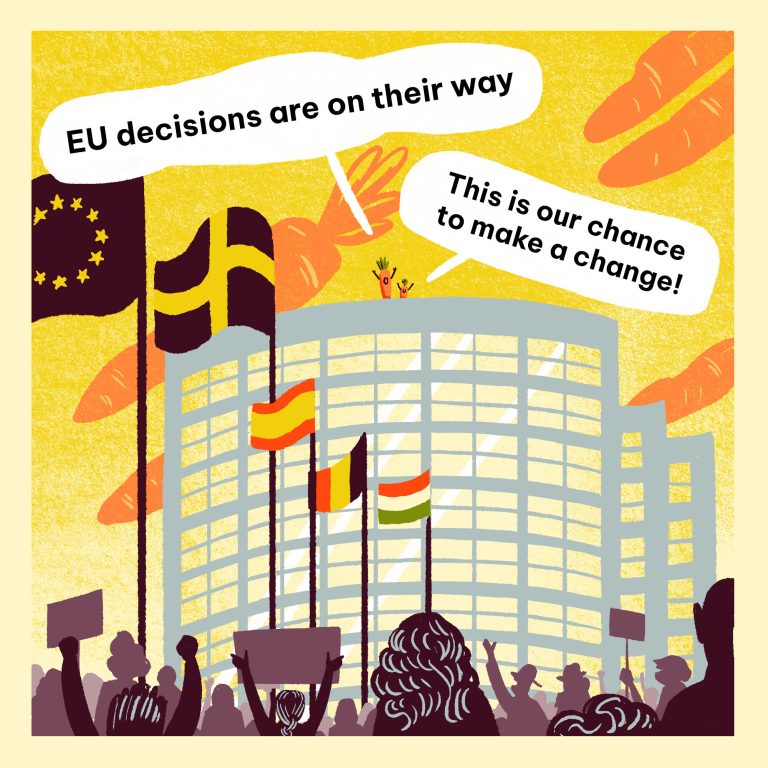
Why now?
As part of the Farm to Fork strategy, the European Commission promised to propose a law for sustainable food systems in September 2023 (SFS Law) – and we are still waiting for it!
This law can be a game changer because not only will it create legally binding obligations, it could also address the multiple dimensions and challenges of our food system. It can mainstream sustainability in all food-related policy areas such as health, environment, trade and agriculture. This can address systemic issues like unequal access to healthy and affordable food, unsustainable agricultural practices, and concentration of power and wealth in the food industry. The framework law could bring together all stakeholders in the food system under one umbrella, and help ensure public authorities fulfill their responsibilities and large agri- & sea-food businesses are held accountable for their actions.
That’s why we have to build pressure for an ambitious SFS law that changes our food system into one in which everyone benefits from sustainable food and farming.
